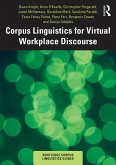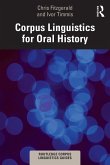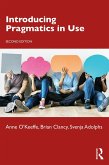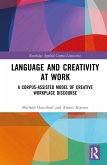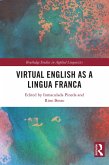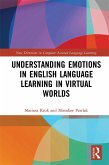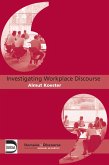Dawn Knight, Svenja Adolphs, Anne O'Keeffe, Christopher Fitzgerald, Justin McNamara, Geraldine Mark, Sandrine Peraldi, Tania Fahey Palma, Fiona Farr, Benjamin Cowan
Corpus Linguistics for Virtual Workplace Discourse (eBook, PDF)
39,95 €
39,95 €
inkl. MwSt.
Sofort per Download lieferbar

20 °P sammeln
39,95 €
Als Download kaufen

39,95 €
inkl. MwSt.
Sofort per Download lieferbar

20 °P sammeln
Jetzt verschenken
Alle Infos zum eBook verschenken
39,95 €
inkl. MwSt.
Sofort per Download lieferbar
Alle Infos zum eBook verschenken

20 °P sammeln
Dawn Knight, Svenja Adolphs, Anne O'Keeffe, Christopher Fitzgerald, Justin McNamara, Geraldine Mark, Sandrine Peraldi, Tania Fahey Palma, Fiona Farr, Benjamin Cowan
Corpus Linguistics for Virtual Workplace Discourse (eBook, PDF)
- Format: PDF
- Merkliste
- Auf die Merkliste
- Bewerten Bewerten
- Teilen
- Produkt teilen
- Produkterinnerung
- Produkterinnerung

Bitte loggen Sie sich zunächst in Ihr Kundenkonto ein oder registrieren Sie sich bei
bücher.de, um das eBook-Abo tolino select nutzen zu können.
Hier können Sie sich einloggen
Hier können Sie sich einloggen
Sie sind bereits eingeloggt. Klicken Sie auf 2. tolino select Abo, um fortzufahren.

Bitte loggen Sie sich zunächst in Ihr Kundenkonto ein oder registrieren Sie sich bei bücher.de, um das eBook-Abo tolino select nutzen zu können.
Corpus Linguistics for Virtual Workplace Discourse provides a thorough and practical step-by-step guide to constructing and analysing a multi-modal corpus of virtual meetings. It draws from original data from video recordings of virtual meetings with a variety of participant profiles from various industries.
- Geräte: PC
- mit Kopierschutz
- eBook Hilfe
- Größe: 8.36MB
Andere Kunden interessierten sich auch für
![Corpus Linguistics for Virtual Workplace Discourse (eBook, ePUB) Corpus Linguistics for Virtual Workplace Discourse (eBook, ePUB)]() Dawn KnightCorpus Linguistics for Virtual Workplace Discourse (eBook, ePUB)39,95 €
Dawn KnightCorpus Linguistics for Virtual Workplace Discourse (eBook, ePUB)39,95 €![Corpus Linguistics for Oral History (eBook, PDF) Corpus Linguistics for Oral History (eBook, PDF)]() Chris FitzgeraldCorpus Linguistics for Oral History (eBook, PDF)39,95 €
Chris FitzgeraldCorpus Linguistics for Oral History (eBook, PDF)39,95 €![Introducing Pragmatics in Use (eBook, PDF) Introducing Pragmatics in Use (eBook, PDF)]() Anne O'KeeffeIntroducing Pragmatics in Use (eBook, PDF)31,95 €
Anne O'KeeffeIntroducing Pragmatics in Use (eBook, PDF)31,95 €![Language and Creativity at Work (eBook, PDF) Language and Creativity at Work (eBook, PDF)]() Michael HandfordLanguage and Creativity at Work (eBook, PDF)42,95 €
Michael HandfordLanguage and Creativity at Work (eBook, PDF)42,95 €![Virtual English as a Lingua Franca (eBook, PDF) Virtual English as a Lingua Franca (eBook, PDF)]() Virtual English as a Lingua Franca (eBook, PDF)42,95 €
Virtual English as a Lingua Franca (eBook, PDF)42,95 €![Understanding Emotions in English Language Learning in Virtual Worlds (eBook, PDF) Understanding Emotions in English Language Learning in Virtual Worlds (eBook, PDF)]() Mariusz KrukUnderstanding Emotions in English Language Learning in Virtual Worlds (eBook, PDF)42,95 €
Mariusz KrukUnderstanding Emotions in English Language Learning in Virtual Worlds (eBook, PDF)42,95 €![Investigating Workplace Discourse (eBook, PDF) Investigating Workplace Discourse (eBook, PDF)]() Almut KoesterInvestigating Workplace Discourse (eBook, PDF)57,95 €
Almut KoesterInvestigating Workplace Discourse (eBook, PDF)57,95 €-
-
-
Corpus Linguistics for Virtual Workplace Discourse provides a thorough and practical step-by-step guide to constructing and analysing a multi-modal corpus of virtual meetings. It draws from original data from video recordings of virtual meetings with a variety of participant profiles from various industries.
Dieser Download kann aus rechtlichen Gründen nur mit Rechnungsadresse in A, B, BG, CY, CZ, D, DK, EW, E, FIN, F, GR, HR, H, IRL, I, LT, L, LR, M, NL, PL, P, R, S, SLO, SK ausgeliefert werden.
Produktdetails
- Produktdetails
- Verlag: Taylor & Francis eBooks
- Seitenzahl: 198
- Erscheinungstermin: 19. Dezember 2024
- Englisch
- ISBN-13: 9781040217269
- Artikelnr.: 72320809
- Verlag: Taylor & Francis eBooks
- Seitenzahl: 198
- Erscheinungstermin: 19. Dezember 2024
- Englisch
- ISBN-13: 9781040217269
- Artikelnr.: 72320809
- Herstellerkennzeichnung Die Herstellerinformationen sind derzeit nicht verfügbar.
Dawn Knight is Professor of English Language and Applied Linguistics at Cardiff University, Wales. Her research interests lie in the areas of corpus linguistics, multimodality and discourse analysis. Dawn has expertise in conceptualising, theorising and applying innovative interdisciplinary approaches/methodologies for extracting and predicting language patterns within/across social and linguistic contexts. Her pioneering work on Welsh language resource development (including CorCenCC and FreeTxt), supported by major AHRC, ESRC and Welsh Government grants, is helping to change the landscape of minoritised language research and the potential real-world applications of corpora/corpus-based enquiry.
Anne O'Keeffe is Professor of Applied Linguistics at Mary Immaculate College, University of Limerick, Ireland. Her publications include From Corpus to Classroom, and Investigating Media Discourse, Introducing Pragmatics in Use 1st. She co-edited The Routledge Handbook of Corpus Linguistics. With Geraldine Mark, she developed the Cambridge University Press English Grammar Profile open database. She is co-editor of Routledge book series: The Routledge Corpus Linguistics Guides and The Routledge Applied Corpus Linguistics. She is also founder and Director of the Inter-Varietal Applied Corpus Studies (IVACS) Research Centre and Network.
Christopher Fitzgerald is a Postdoctoral Researcher on the Interactional Variation Online project at Mary Immaculate College, Limerick, Ireland. His research interests include, the language of memory and oral history, second language acquisition and corpus linguistics. His publications in these areas include Investigating a Corpus of Historical Oral Testimonies: The Linguistic Construction of Certainty, Cohesion and Solidarity in COVID-related Addresses to the Nation and Penetrating Historical Discourse's Truth Matrix: A Corpus Analysis of Oral History Testimonies.
Justin McNamara works as a Postdoctoral Researcher and lectures in English as a Foreign Language, Applied Linguistics and Research Methodologies at Mary Immaculate College, Limerick, Ireland. His research interests are in the areas of corpus linguistics, formulaic language, Teacher training, Teaching modern languages, Irish English and pragmatics. His publications include: When a Frog Grows Hair: ESOL Learner's use of Figurative Language in ELT 10th Anniversary Bulletin, 'Interactional Variation Online (IVO): Corpus Approaches to Analysing Multi-modality in Virtual Meetings' International Journal of Corpus Linguistics Special Issue on Virtual Workplace Communication (IJCL).
Geraldine Mark is an applied corpus linguist with interests in discourse analysis, register, multi-modal interaction, L1 and L2 development and materials design. Publications include 'Teachers' engagement with corpora for language teaching materials development', Second language teacher education; Exploring Part of Speech (POS)-tag sequences in a large-scale learner corpus of L2 English: A developmental perspective, Corpora 19, 1;. Principled pattern curation to guide data-driven learning design. Applied Corpus Linguistics, 2 (3).
Dr Sandrine Peraldi is an Assistant Professor at University College Dublin, in the School of Languages, Cultures & Linguistics (SLCL). She is currently Head of Linguistics and Deputy Head of School. Prior to joining UCD in 2017, she was, over a decade, ISIT's Research Director, a French Grande Ecole specialising in Translation and Intercultural Studies. Her areas of expertise and publication include Terminology, Corpus-informed Discourse Analysis, Intercultural Communication and finally Translation Studies. Dr Peraldi has been involved in multiple EU-funded projects with a specific focus on professional discourse communities and she has an extensive expertise in developing successful action research projects, enabling students to engage with researchers and industry on research-led projects. More recently, she joined the European Network On Lexical Innovation (ENEOLI) Cost Action project aimed at highlighting the importance of neology in academic and professional settings.
Tania Fahey Palma is an Assistant Professor in Organisational and Intercultural Communication at Erasmus University Rotterdam, the Netherlands. Her research focuses on language, power and identity in workplace contexts and organisations. She has led funded projects on Healthcare Communication and has worked extensively with industry to improve communication practices in health services and law. She previously worked at the University of Aberdeen where she was Dean for East Asia and Director for Postgraduate Taught Studies.
Fiona Farr is Professor of Applied Linguistics and TESOL at the University of Limerick, Ireland. She is also Adjunct Professor at INN, Hamar, Norway. Her key areas of expertise are teacher education, reflective practice, and applied corpus linguistics. Her most recent book is The Reflective Cycle of the Teaching Practicum (2023, Equinox, with Farrell). She is co-editor of the EUP Textbooks in TESOL Series, and is Associate Editor of the Journal Second Language Teacher Education.
Benjamin Cowan is Professor at University College Dublin's School of Information and Communication Studies, Dublin, Ireland. His research focuses on using cognitive psychology and psycholinguistic approaches to understand dialogue interaction with and through machines. Prof. Cowan publishes widely within the field of Human Computer Interaction (HCI), with recent research focusing on Bridging social distance during social distancing: exploring social talk and remote collegiality in video conferencing (HCIJ) and Audience design and egocentrism in reference production during human-computer dialogue (IJHCS).
Svenja Adolphs is Professor of English Language and Linguistics at the University of Nottingham, UK. Her research interests are in the areas of corpus linguistics, pragmatics and discourse analysis. She has published widely in these areas, including Corpus and Context: Investigating Pragmatics Functions in Spoken Discourse, Introducing Pragmatics in Use and Spoken Corpus Linguistics: From Monomodal to Multimodal.
Anne O'Keeffe is Professor of Applied Linguistics at Mary Immaculate College, University of Limerick, Ireland. Her publications include From Corpus to Classroom, and Investigating Media Discourse, Introducing Pragmatics in Use 1st. She co-edited The Routledge Handbook of Corpus Linguistics. With Geraldine Mark, she developed the Cambridge University Press English Grammar Profile open database. She is co-editor of Routledge book series: The Routledge Corpus Linguistics Guides and The Routledge Applied Corpus Linguistics. She is also founder and Director of the Inter-Varietal Applied Corpus Studies (IVACS) Research Centre and Network.
Christopher Fitzgerald is a Postdoctoral Researcher on the Interactional Variation Online project at Mary Immaculate College, Limerick, Ireland. His research interests include, the language of memory and oral history, second language acquisition and corpus linguistics. His publications in these areas include Investigating a Corpus of Historical Oral Testimonies: The Linguistic Construction of Certainty, Cohesion and Solidarity in COVID-related Addresses to the Nation and Penetrating Historical Discourse's Truth Matrix: A Corpus Analysis of Oral History Testimonies.
Justin McNamara works as a Postdoctoral Researcher and lectures in English as a Foreign Language, Applied Linguistics and Research Methodologies at Mary Immaculate College, Limerick, Ireland. His research interests are in the areas of corpus linguistics, formulaic language, Teacher training, Teaching modern languages, Irish English and pragmatics. His publications include: When a Frog Grows Hair: ESOL Learner's use of Figurative Language in ELT 10th Anniversary Bulletin, 'Interactional Variation Online (IVO): Corpus Approaches to Analysing Multi-modality in Virtual Meetings' International Journal of Corpus Linguistics Special Issue on Virtual Workplace Communication (IJCL).
Geraldine Mark is an applied corpus linguist with interests in discourse analysis, register, multi-modal interaction, L1 and L2 development and materials design. Publications include 'Teachers' engagement with corpora for language teaching materials development', Second language teacher education; Exploring Part of Speech (POS)-tag sequences in a large-scale learner corpus of L2 English: A developmental perspective, Corpora 19, 1;. Principled pattern curation to guide data-driven learning design. Applied Corpus Linguistics, 2 (3).
Dr Sandrine Peraldi is an Assistant Professor at University College Dublin, in the School of Languages, Cultures & Linguistics (SLCL). She is currently Head of Linguistics and Deputy Head of School. Prior to joining UCD in 2017, she was, over a decade, ISIT's Research Director, a French Grande Ecole specialising in Translation and Intercultural Studies. Her areas of expertise and publication include Terminology, Corpus-informed Discourse Analysis, Intercultural Communication and finally Translation Studies. Dr Peraldi has been involved in multiple EU-funded projects with a specific focus on professional discourse communities and she has an extensive expertise in developing successful action research projects, enabling students to engage with researchers and industry on research-led projects. More recently, she joined the European Network On Lexical Innovation (ENEOLI) Cost Action project aimed at highlighting the importance of neology in academic and professional settings.
Tania Fahey Palma is an Assistant Professor in Organisational and Intercultural Communication at Erasmus University Rotterdam, the Netherlands. Her research focuses on language, power and identity in workplace contexts and organisations. She has led funded projects on Healthcare Communication and has worked extensively with industry to improve communication practices in health services and law. She previously worked at the University of Aberdeen where she was Dean for East Asia and Director for Postgraduate Taught Studies.
Fiona Farr is Professor of Applied Linguistics and TESOL at the University of Limerick, Ireland. She is also Adjunct Professor at INN, Hamar, Norway. Her key areas of expertise are teacher education, reflective practice, and applied corpus linguistics. Her most recent book is The Reflective Cycle of the Teaching Practicum (2023, Equinox, with Farrell). She is co-editor of the EUP Textbooks in TESOL Series, and is Associate Editor of the Journal Second Language Teacher Education.
Benjamin Cowan is Professor at University College Dublin's School of Information and Communication Studies, Dublin, Ireland. His research focuses on using cognitive psychology and psycholinguistic approaches to understand dialogue interaction with and through machines. Prof. Cowan publishes widely within the field of Human Computer Interaction (HCI), with recent research focusing on Bridging social distance during social distancing: exploring social talk and remote collegiality in video conferencing (HCIJ) and Audience design and egocentrism in reference production during human-computer dialogue (IJHCS).
Svenja Adolphs is Professor of English Language and Linguistics at the University of Nottingham, UK. Her research interests are in the areas of corpus linguistics, pragmatics and discourse analysis. She has published widely in these areas, including Corpus and Context: Investigating Pragmatics Functions in Spoken Discourse, Introducing Pragmatics in Use and Spoken Corpus Linguistics: From Monomodal to Multimodal.
List of figures
List of tables
Preface
Acknowledgements1. Workplace discourse
2. Approaches and methods for analysing virtual workplace discourse
3. Technology-mediated interaction - from voice to video
4. Constructing a corpus of online meetings
5. How to analyse a multi-modal corpus: A case study of backchannels
6. Analysing non-verbal communication in virtual workplace discourse
7. Managing Online Meetings
Index
List of tables
Preface
Acknowledgements1. Workplace discourse
2. Approaches and methods for analysing virtual workplace discourse
3. Technology-mediated interaction - from voice to video
4. Constructing a corpus of online meetings
5. How to analyse a multi-modal corpus: A case study of backchannels
6. Analysing non-verbal communication in virtual workplace discourse
7. Managing Online Meetings
Index
List of figures
List of tables
Preface
Acknowledgements1. Workplace discourse
2. Approaches and methods for analysing virtual workplace discourse
3. Technology-mediated interaction - from voice to video
4. Constructing a corpus of online meetings
5. How to analyse a multi-modal corpus: A case study of backchannels
6. Analysing non-verbal communication in virtual workplace discourse
7. Managing Online Meetings
Index
List of tables
Preface
Acknowledgements1. Workplace discourse
2. Approaches and methods for analysing virtual workplace discourse
3. Technology-mediated interaction - from voice to video
4. Constructing a corpus of online meetings
5. How to analyse a multi-modal corpus: A case study of backchannels
6. Analysing non-verbal communication in virtual workplace discourse
7. Managing Online Meetings
Index

